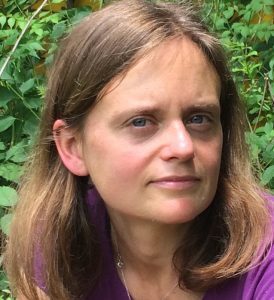Sarah Neidhardt: Twenty Acres A Seventies Childhood in the Woods
May 23, 2024 by David
Filed under Non-Fiction, WritersCast
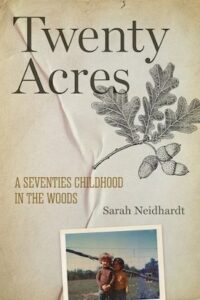 Twenty Acres: A Seventies Childhood in the Woods – Sarah Neidhardt – University of Arkansas Press – Paperback – 320 pages – 9781682262276 – $29.95 – Published March 7, 2023. Audiobook and ebook versions available at varying prices.
Twenty Acres: A Seventies Childhood in the Woods – Sarah Neidhardt – University of Arkansas Press – Paperback – 320 pages – 9781682262276 – $29.95 – Published March 7, 2023. Audiobook and ebook versions available at varying prices.
Twenty Acres is a wonderful, rewarding family memoir that will resonate both for elder veterans of the sixties and seventies “back to the land” counter culture but most especially for their now adult children, of which author Neidhardt is one. She was just a baby when her quite intelligent, middle class, young, naive parents left Colorado Springs to move to an extremely isolated part of the Arkansas Ozarks, where despite being woefully unprepared and underfunded, they managed to build a cabin and set out to live their lives and raise their children away from the materialist world they came from.
Their idealism was quickly met with the harsh realities of country life, of course. Sarah Neidhardt’s early life with her struggling parents and her siblings was not easy, and the crushing poverty and difficulties they endured as a family are reconstructed by Neidhardt as a way to understand her early life in deeply rural Arkansas. Still, the book is filled with many joyful and humorous moments – it’s not an altogether dark story, but a complex one that is filled with the ambiguities and complexities of family life in any time or place.
This story is similar to other back to the land adventures I’ve read that did not end well, or ended with the participants deflated by the rigors of a life they were never prepared for, though it is different from some because of the relatively extreme isolation the Neidhardt family experienced. Communards had it better in some ways than those who set out on their own in places where the culture was so deeply foreign to their generally urban or suburban backgrounds and counter culture values. But the underlying conflicts of culture, education, expectations, and the challenges of rural life really are common for so many of the children of the counter culture, unwilling participants in what was generally a short-lived socio-political explosion that had long lasting ramifications for its youngest and most innocent participants (even as that era’s most deeply held values and beliefs have survived and become entwined in modern culture in so many important ways).
It’s been more than fifty years since the era of the hippies, and books like this one will help set down and explain the history of that brief period of time, when so many young people thought we could change the world for the better. Talking to Sarah about her book, her family, and the process of writing their story was rewarding for me and I hope for all who listen to our conversation.
Sarah Neidhardt has worked as a bookseller, secretary, paralegal, copyeditor, and stay-at-home mother. She grew up in Arkansas and Northern California and now lives in Portland, Oregon, with her husband and teenage son.
“Disillusioned with the modern world and idealistic about living closer to nature, Sarah Neidhardt’s parents packed up from Colorado–a place that some other back-to-landers would seek out–and moved to small, isolated Fox, Arkansas to attempt living completely self-sufficiently and off-the-grid. In this memoir, Neidhardt examines her memories from that time, and also pinpoints one of the most particularly problematic parts of the back-to-the-land movement, which is that many of its participants were anchored in privilege. … A memoir infused with both empathy and inquiry.”—–Wendy J. Fox, Electric Literature
Author website here.
Buy the book here.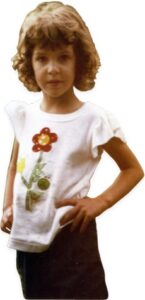
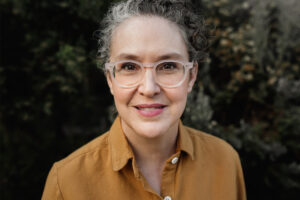
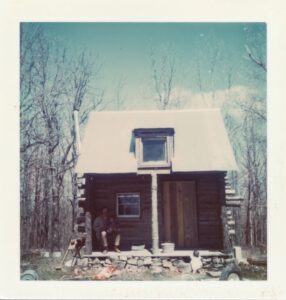
Podcast: Play in new window | Download
Helen Zuman: Mating in Captivity [A Memoir]
September 8, 2020 by David
Filed under Non-Fiction, WritersCast
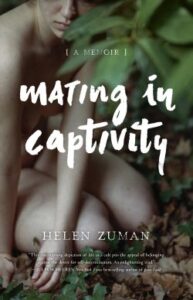 Mating in Captivity: A Memoir – Helen Zuman – 9781631523373 – She Writes Press – paperback – 248 pages – May 8, 2018 – $16.95 – ebook versions for sale at lower prices
Mating in Captivity: A Memoir – Helen Zuman – 9781631523373 – She Writes Press – paperback – 248 pages – May 8, 2018 – $16.95 – ebook versions for sale at lower prices
When I was in my younger hippie Whole Earth Catalog reading period of life, I became intensely interested in communes and alternative social structures, what are now often called “Intentional Communities.” Such utopian constructs have been in existence in America for many years (think about the Shakers in the 19th century) and the dream of a better way of living together than nuclear families persists to this day. I spent a couple summers on a working farm commune in Oregon, and over the years have studied and thought about the challenges and rewards of these communal work and living communities. Given the stresses that modern corporate capitalism places on individuals and families, it makes sense for us to explore different structures, despite the complexities of living together after the common experience of growing up in much narrower family units.
When Helen Zuman graduated from Harvard, searching for a better way to live, she too wanted to learn about and explore alternative intentional communities. After considering a variety of options, and getting a fellowship to study alternative structures, she moved to the North Carolina-based Zendik Farm in 1999. Initially she was unsure of whether it would be the right place for her, but it did not take her long to feel that she belonged. She gave the commune all her money and made the commitment to become a full time, permanent member of what she believed was a meaningful alternative to what the members called “dealthculture” – meaning anyone outside of the group itself. For her, as a inexperienced social being, the Zendik experience, based on sharing work, love, life and sex, made sense. But it turned out that the lived experience of the farm commune was not quite what it seemed, and without realizing it, Helen had become a member of a personal cult run by Arol, the Farm’s matriarch, who manipulated and controlled the members to meet her own needs at the expense of all else. Mating in Captivity is an illuminating and compellingly personal story of how a person can become a member of a cult, so simple, and then how one can escape, so difficult.
It’s ironic that the widespread desire for redefining social structures created by the tensions of modern capitalism has so often led to such fraught and misshapen group think. But Helen’s story is actually an optimistic one, as she was able to come through this experience and to make a life for herself that is, in fact, meaningful and defining outside the narrow structures laid down for us by the imperatives of industrial life.
This is Helen Zuman’s raw and honest confession and exploration of how a cult works and what it takes for an individual to escape one, and become her truer self. Mating in Captivity shows how cults work and both why people join and how they must escape in order to grow into fully functioning beings. I really admired her honesty throughout, and her storytelling is adept and strong. It’s a terrific memoir and one that readers of all kinds will appreciate.
Despite the ways in which things go off the tracks for us all too often, we can and must hope that a meaningful form of communalism is possible. If humans are going to live sustainably on this planet, it is likely a necessary adaptation for us to make.
“Just as the Zendik community, a cult, pulled Helen Zuman in and held her, her account of her time there will pull you in and hold you. Her clear-eyed observations of her fellow idealists—and of herself—are honest, compelling, and sophisticated.”
–Daniel Menaker, author of My Mistake: A Memoir
“How timely, how telling this story of an inexperienced young woman who fell prey to a cult because of the abuse to which she’d been subjected by male strangers. Only within the fold, where there were rules protecting the women, did she feel safe enough to explore her sexuality and learn to love. So she surrendered her possessions, her will, her youth. Read Mating in Captivity as a cautionary tale, one I hope will spark a desire to create a better world for our daughters.”
–Leah Lax, author of Uncovered: How I Left Hasidic Life and Finally Came Home
Mating in Captivity, which she calls “a cult memoir for smart people” is Helen’s first book. It was named a Kirkus Best Indie Memoir of 2018, was a finalist in Creative Nonfiction for the Community of Literary Magazines and Presses’ 2019 Firecracker Award, and was both first runner-up in memoir and a finalist for First Horizon and Grand Prize honors in the 2020 Eric Hoffer Awards. Other work has appeared in The New Farmers Almanac, in Communities and Livelihood magazines, and on the Foundation for Intentional Community’s website. She was born in London and raised in Brooklyn, and with her husband, Helen currently homesteads near the Hudson River in Beacon, New York.
Helen and I had a terrific and broad ranging conversation. I also recommend reading her post, linked above at the Foundation for Intentional Community site.
Buy the book on Bookshop.org and support independent bookstores!
Podcast: Play in new window | Download

